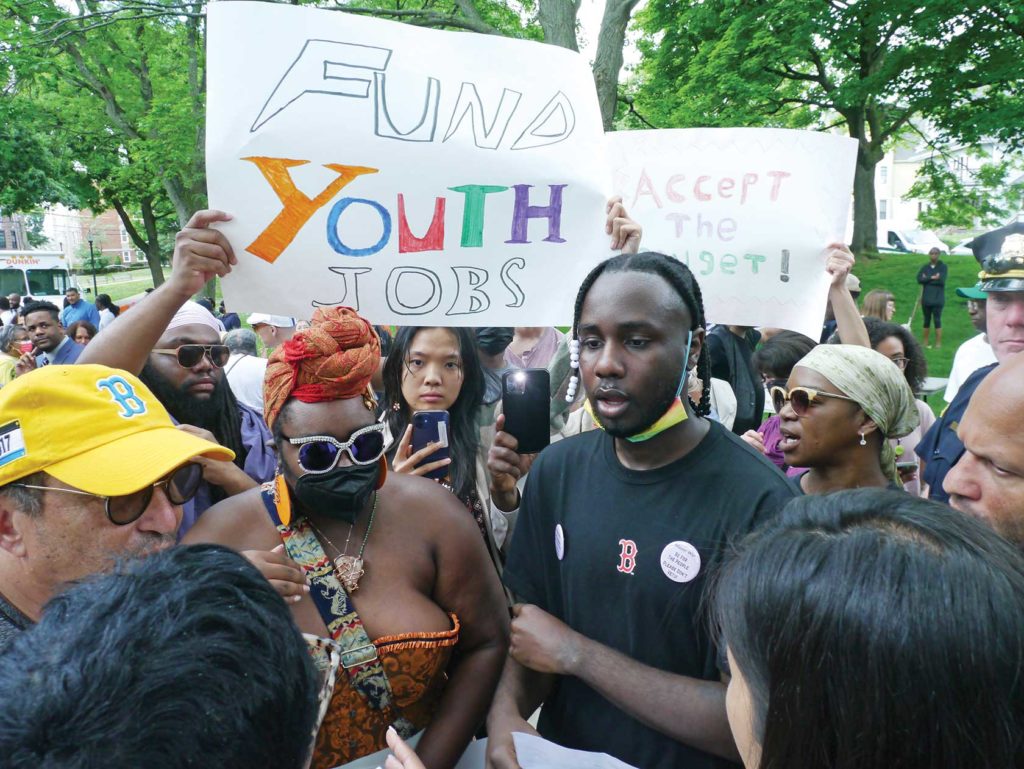
Mayor Michelle Wu may be longing for the days when neighborhood coffee hours were genteel gatherings with local civic activists seeking selfies with the city’s top official. As has been the case for much of her tenure, the public appearances have often been hijacked by a handful anti-mask, anti-vaccine protestors whose antics haven’t been quelled by the easing of restrictions in recent months.
But in Roxbury’s Horatio Harris Park, Wu’s coffee hour was met with a different strain of activism: protestors angry with the city’s reconstruction of Malcolm X Park, which promises the removal of more than 30 mature trees, demonstrators from the Mildred Hailey public housing development angry at what they say are deteriorating conditions and a reconstruction plan that will build market-rate housing in their midst and members of the Defund BosCops coalition, who pressed the mayor to adopt a $10 million cut to the Boston Police Department’s overtime budget.
Wu has refused to make the cut, noting that the police department has consistently overspent the overtime budget.
“Every single year, as far as we can remember back or as far back as this line item has existed, it has been overspent,” she told reporters after the exchange with coalition members. “The way to reduce overtime and to get to reforms isn’t by pressing out a number on a piece of paper. It’s by implementing the coordinated leadership, the organizational changes and the collective bargaining reforms that are necessary to make those changes stick.”
Wu said her administration would begin the collective bargaining process with police unions once she appoints a new police superintendent.
Coalition members expressed frustration with Wu, who promised to cut the police budget while on the campaign trail, but did not commit to the 10% reduction that they sought.
This year, the coalition narrowed their demand to a $10 million cut from the overtime budget and a $3 million cut from the department’s proposed $396 million budget. Coalition members want the city to spend $19 million on youth jobs, up from Wu’s proposed budget of $12.6 million and $10 million for rental subsidies, up from the $7.5 million in Wu’s budget.
They point out that there are 469 Boston police officers who earn more than $50,000 a year in overtime and say that funding would be better put to use in programs that prevent crime.
The coalition’s demands mirror the $10 million cut to the overtime budget that passed overwhelmingly by the City Council last week, a cut the mayor vetoed, along with other modifications councilors made to the budget. This is the first year the Council has the power to write its own version of the city’s budget.
Nevertheless, coalition members expressed frustration with Wu, given her previous stands in favor of cutting the overall police budget by 10% when she served on the Council.
“It’s really disappointing to many people to see someone who stood up and spoke against the police budget in the past, to then see her release a budget that’s exactly the same as those that came before,” said Fatema Ahmed, the executive director of the Muslim Justice League.
While police officials have said they need more officers on duty in order to reduce overtime, Ahmed noted that a recent ACLU study found that there is no correlation between the department’s expanding overtime budget and the number of officers on the force.
In addition to funding for youth jobs, coalition members say they would like to see more funding go to a crisis response team of mental health professionals rather than continuing to allow police to respond to people experiencing a mental health crisis.
They are also calling for civilians to be allowed to direct traffic during road construction projects. Currently, only police officers can work such details. In general, the group is calling for more funding for social services that help prevent crime by giving teenagers viable alternatives.
“Police are collecting overtime when these funds should be going to youth jobs,” said coalition member Nate Nichols.
Coalition member Fiona Phie noted that Wu arrived at Horatio Harris park with a phalanx of police officers.
“When she was in the City Council she talked about accountability and how to respond to protestors,” she said. “She didn’t mention over-policing. The fact that her response is with a police presence is disappointing.”
Coalition members have asked to meet with Wu since she took office in November, but they say she has not yet agreed to do so.
“We got an automated response,” said organizer Khalil Howe.
“As a mayor, her answers to our demands changed,” Phie said. “That’s a fact. Our job as community organizers is to put pressure on her.”







